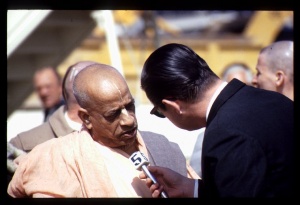CC Madhya 17.39 (1975): Difference between revisions
(Vanibot #0027: CCMirror - Mirror CC's 1996 edition to form a basis for 1975) |
(Vanibot #0020: VersionCompareLinker - added a link to the Version Compare feature) |
||
| Line 2: | Line 2: | ||
<div style="float:left">'''[[Sri Caitanya-caritamrta (1975)|Śrī Caitanya-caritāmṛta (1975)]] - [[CC Madhya (1975)|Madhya-līlā]] - [[CC Madhya 17 (1975)|Chapter 17: The Lord Travels to Vṛndāvana]]'''</div> | <div style="float:left">'''[[Sri Caitanya-caritamrta (1975)|Śrī Caitanya-caritāmṛta (1975)]] - [[CC Madhya (1975)|Madhya-līlā]] - [[CC Madhya 17 (1975)|Chapter 17: The Lord Travels to Vṛndāvana]]'''</div> | ||
<div style="float:right">[[File:Go-previous.png|link=CC Madhya 17.38 (1975)|Madhya-līlā 17.38]] '''[[CC Madhya 17.38 (1975)|Madhya-līlā 17.38]] - [[CC Madhya 17.40 (1975)|Madhya-līlā 17.40]]''' [[File:Go-next.png|link=CC Madhya 17.40 (1975)|Madhya-līlā 17.40]]</div> | <div style="float:right">[[File:Go-previous.png|link=CC Madhya 17.38 (1975)|Madhya-līlā 17.38]] '''[[CC Madhya 17.38 (1975)|Madhya-līlā 17.38]] - [[CC Madhya 17.40 (1975)|Madhya-līlā 17.40]]''' [[File:Go-next.png|link=CC Madhya 17.40 (1975)|Madhya-līlā 17.40]]</div> | ||
{{CompareVersions|CC|Madhya 17.39|CC 1975|CC 1996}} | |||
{{RandomImage}} | {{RandomImage}} | ||
==== TEXT 39 ==== | ==== TEXT 39 ==== | ||
| Line 20: | Line 19: | ||
<div class="synonyms"> | <div class="synonyms"> | ||
yatra—where; naisarga—by nature; durvairāḥ—living in enmity; saha āsan—live together; nṛ—human beings; mṛga-ādayaḥ—and animals; mitrāṇi—friends; iva—like; ajita—of Lord Śrī Kṛṣṇa; āvāsa—residence; druta—gone away; | yatra—where; naisarga—by nature; durvairāḥ—living in enmity; saha-āsan—live together; nṛ—human beings; mṛga-ādayaḥ—and animals; mitrāṇi—friends; iva—like; ajita—of Lord Śrī Kṛṣṇa; āvāsa—residence; druta—gone away; ruj—anger; tarṣaṇa-ādikam—thirst and so on. | ||
</div> | </div> | ||
| Line 27: | Line 26: | ||
<div class="translation"> | <div class="translation"> | ||
"Vṛndāvana is the transcendental abode of the Lord. There is no hunger, anger or thirst there. Though naturally inimical, both human beings and fierce animals live together there in transcendental friendship." | |||
</div> | </div> | ||
| Line 34: | Line 33: | ||
<div class="purport"> | <div class="purport"> | ||
This is a statement from Śrīmad-Bhāgavatam ([[SB 10.13.60]]). After stealing the cowherd boys and | This is a statement from Śrīmad-Bhāgavatam ([[SB 10.13.60]]). After stealing the cowherd boys, calves and cows of Śrī Kṛṣṇa, Lord Brahmā kept them asleep and hid them. After a moment, Brahmā returned to see Kṛṣṇa's condition. When he saw that Kṛṣṇa was still busy with His cowherd boyfriends and animals and was not disturbed, Lord Brahmā appreciated the transcendental opulence of Vṛndāvana. | ||
</div> | </div> | ||
Latest revision as of 10:48, 27 January 2020

A.C. Bhaktivedanta Swami Prabhupada
TEXT 39
- yatra naisarga-durvairāḥ
- sahāsan nṛ-mṛgādayaḥ
- mitrāṇīvājitāvāsa-
- druta-ruṭ-tarṣaṇādikam
SYNONYMS
yatra—where; naisarga—by nature; durvairāḥ—living in enmity; saha-āsan—live together; nṛ—human beings; mṛga-ādayaḥ—and animals; mitrāṇi—friends; iva—like; ajita—of Lord Śrī Kṛṣṇa; āvāsa—residence; druta—gone away; ruj—anger; tarṣaṇa-ādikam—thirst and so on.
TRANSLATION
"Vṛndāvana is the transcendental abode of the Lord. There is no hunger, anger or thirst there. Though naturally inimical, both human beings and fierce animals live together there in transcendental friendship."
PURPORT
This is a statement from Śrīmad-Bhāgavatam (SB 10.13.60). After stealing the cowherd boys, calves and cows of Śrī Kṛṣṇa, Lord Brahmā kept them asleep and hid them. After a moment, Brahmā returned to see Kṛṣṇa's condition. When he saw that Kṛṣṇa was still busy with His cowherd boyfriends and animals and was not disturbed, Lord Brahmā appreciated the transcendental opulence of Vṛndāvana.